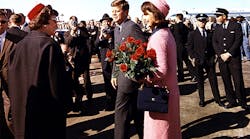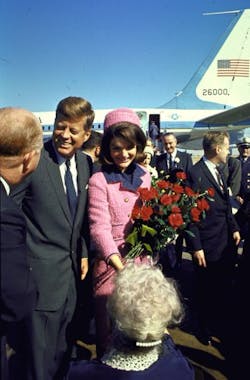I can't remember if I cried, when I read about his widowed bride. Something touched me deep inside, the day, the music died — Don McLean, "American Pie"
America pauses to remember one of its fallen heros: a man with great vision and intergity, but great flaws as well. John Fitzgerald Kennedy was the first television president, young, vibrant, and representing all that was great about this country. He was a bridge from the past to the future. Yet he was embroiled in controversy, both personal and public, that made him a target of so many enemies. It's no wonder that conspiracy theories still abound today.
On November 22, 1963, the day began beautifully: it was bright and sunny as crowds gathered to greet the king and queen of Camelot as Kennedy began a political stomp through Texas to help strengthen a divided Democratic party. The day would not end the way it began and America would be forever changed.
I was six years old on that date and home from school with a bronchial infection. I remember November 22, 1963 with a vividness that is almost frightening. I was in the living room of our two-family home, on the couch, watching television with my baby sitter. Suddenly the black-and-white RCA console began emitting sharp beeps and Walter Cronkite interrupted the programing to announce that the president of the United States had been shot and then later, had died. That black-and-white image of Cronkite scared me more than the news of Kennedy's passing. I don't why. It just did. And to this day, when I see clips of that broadcast, it gives me chills.
I remember my older sister coming home from school in tears. Once the news broke, they closed the schools and sent everyone home. She knew the president was gone, and was terrified. Our mother came home from work early and we sat around the TV, in the dark, crying, holding each other, eating Swanson's TV dinners, and watching the television, waiting for every scrap of news we could get. Going to bed just wasn't an option.
That horrible day forever changed this country, in a way that's been described as a loss of innocence. I believe that's true. But it also was the first time that the American people, as a whole, felt vulnerable and afraid — a feeling that was almost matched several more times in my life -- from the murders of Reverend Martin Luther King and Bobby Kennedy, to the 9/11 terror attacks.
The lesson I've learned over all these years is that if we remain united, as a people and a nation, we not only overcome such terrible tragedies, but grow and move on from them. Yes, on this date 50 years ago, our innocence was lost and our security shaken. But we are still here today and a greater nation than ever before.
It's a much different country, today. Achieving one of Kennedy's dreams, to put a man on the moon, helped to lead a technological revolution that changed the way we read, teach, learn, and communicate. It's created instant news via social media. This technology has made life so much easier today, in many ways, than it was before. But it has also contributed a callousness, a hardness, with instant news at our fingertips, on our phones, in the workplace and our homes. Our focus seems to be on sensational headlines and quick entertaining or embarrassing sound bytes that pervade everything, including our politics. Life moves so much faster today than it did in 1963.
On this day, it's good to sit back from all that and think about a time when this country was simpler, almost dreamy, like the Arthurian legends of Camelot. This is a sad day today, but the lesson, at least for me, is that there is always hope and no matter what happens, we will carry on.
So do you remember where you were on the day John Fitzgerald Kennedy died? Please share your story with us here.
Rest in peace JFK.










